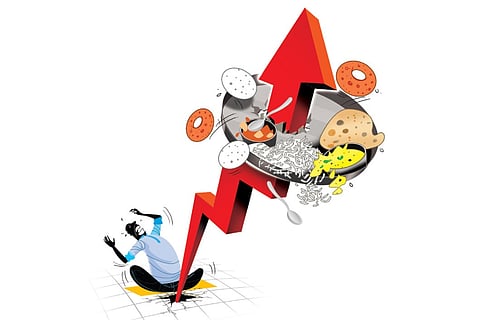

NEW DELHI: A national think-tank comprising independent medical experts, paediatricians, and nutritionists has written to political parties to include in their manifesto measures to stop the rising consumption of junk food.
The Nutrition Advocacy in Public Interest-India (NAPi) has also written to parliamentarians to seek a political solution to this burning issue.
n their letters, the think tank has urged politicians to commit, in their manifesto, to enact legislation for warning labels on high sugar/salt/fat (HFSS) food products and impose reasonable restrictions on the advertising of junk foods. This is aimed at safeguarding public health, particularly that of children and youth, from non-communicable diseases (NCDs)
Extensive scientific evidence has found associations between increasing consumption of HFSS food products with overweight, diabetes, heart disease, hypertension, cancers, depression, and mental health issues, the letter said.
Apart from political parties, they have also written letters to MPs, including BJP leaders Nirmala Sitharaman, Union Finance Minister, Dr. Jitendra Singh, Minister of State for Science and Technology, Dr. Harshvardhan, former Union Health Minister and Prakash Javadekar, former minister of state for the environment with independent charge; Congress leaders, Shashi Tharoor, P. Chidambaram and Jairam Ramesh; DMK's Kanimozhi, Sharad Pawar-led Nationalist Congress Party (NCP) Supriya Sule, and Trinamool Congress (TMC), Derek O'Brien among others, on the issue.
Attaching TNIE's January 25 article on the ‘rising consumption of junk food may lead to obesity and diabetes in Indians,' the NAPi letter urged the politicians that as the 2024 elections draw close, it may be worthwhile to consider this critical public health issue and hoped the issue gets reflected in the Party manifesto.
The think tank also wrote to Sitaram Yechury, CPI (M) General Secretary; CPI senior leader Annie Raja, who is the general secretary of the National Federation of Indian Women; Pankaj Kumar Gupta, National Secretary Member, National Executive, Aam Aadmi Party (AAP) and are planning to write to National People's party and Bahujan Samaj Party (BSP). So far, they have received acknowledgement from Supriya Sule.
According to Dr Arun Gupta, Convener, Nutrition Advocacy in Public Interest (NAPi), "It is the political parties which form governments both at the centre and the states. We want to make them aware of this pressing issue of rising consumption of junk food and resulting obesity and diabetes, and they may like to show their commitment to public health through their manifesto."
“If such a Bill is enacted into law, it will halt the rising obesity and diabetes by reducing consumption of unhealthy foods high in sugar, salt, and saturated fats. This is also one of the targets for 2025 set by the Union Health Ministry," said Gupta, a former member in the Prime Minister's Council on India's Nutrition Challenges.
In a letter to B. L. Santhosh, National General Secretary, BJP, NAPi quoted the recent survey conducted by the Indian Council of Medical Research-India Diabetes (ICMR-INDIAB) survey, which was published in the Lancet, that said that amongst adults over 20 years, the prevalence of diabetes is reported to be 11.4%, pre‑diabetes 15.3%, hypertension 35.5%, generalised obesity 28.6%, abdominal obesity 39.5% and hypercholesterolemia to be 24%.
Noting that it is "worrying," NAPi said, in India, rising consumption of such unhealthy diets has been documented, and it is one of the primary reasons for obesity and diabetes.
“It is not surprising that India is witnessing a massive public health crisis. The rising consumption of unhealthy diets is led by aggressive marketing and misleading labeling by the food industry,” said the letter, signed by other eminent experts, including Dr Vandana Prasad, Community Pediatrician, Public Health Resource Network (PHRN) and Jan Swasthya Abhiyan; Prof. K P Kushwaha, Pediatrician and former principal, BRD Medical College Gorakhpur; Dr Umesh Kapil, Professor Department of Epidemiology, Biostatistics and Clinical Research, Institute of Liver and Biliary Sciences, Delhi; Nupur Bidla, social work professional.“This requires strong political and policy actions in order to reduce the consumption of such unhealthy diets. The key policies interventions include legal ban on advertising and marketing and health warning on the front of pack labels,” the letter said.
These policy interventions are scientifically validated and effective in reducing the intake of unhealthy diets in the Latin American Region, the letter added.
Junk food effect
According to a recent survey conducted by the Indian Council of Medical Research-India Diabetes, which was published in the Lancet, the prevalence of lifestyle diseases in adults over 20 years was observed thus:
28.6% Generalised obesity
11.4% Diabetes
15.3% Pre‑diabetes
35.5% Hypertension